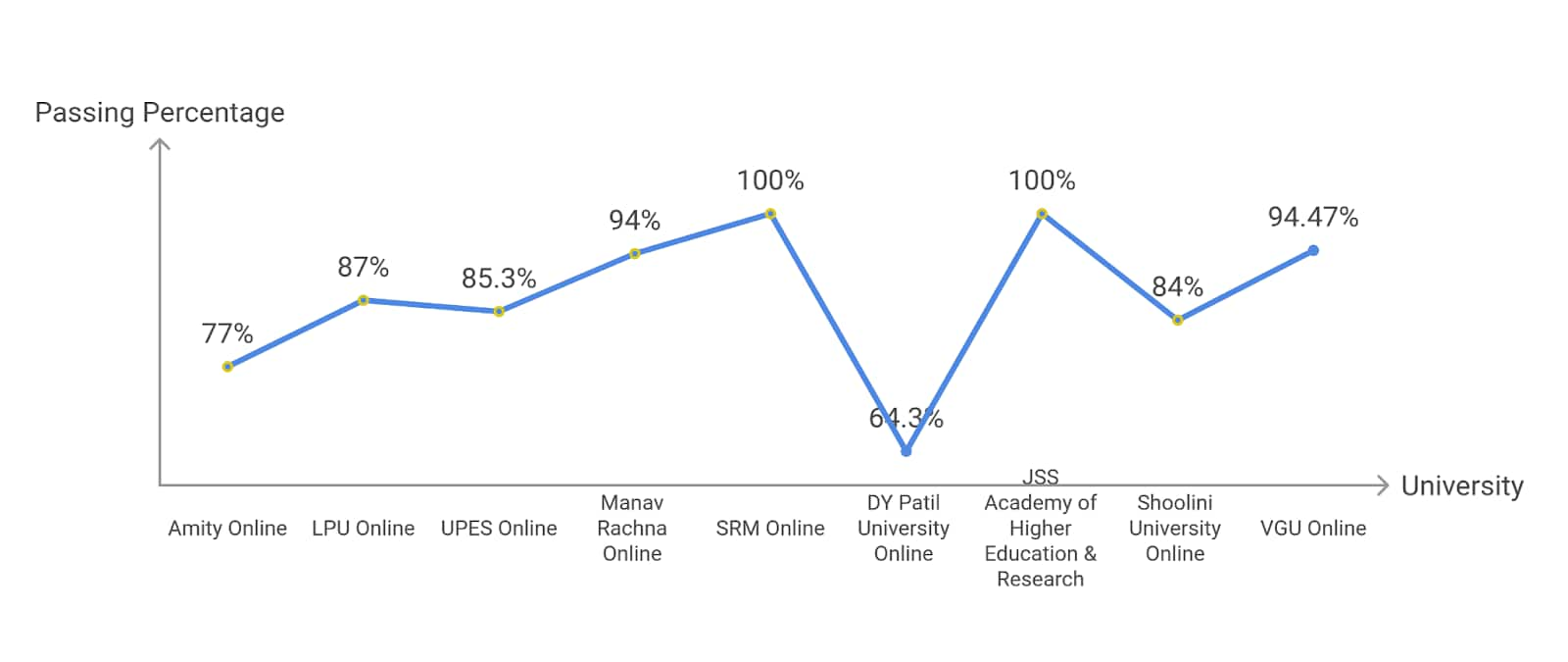IMT Ghaziabad PGDM Admissions 2026
AACSB, NBA & SAQS Accredited | H-CTC 41.55 LPA | Merit Based Scholarship
Over the past three years, online MBA programmes had an intake capacity of 5 lakh, and enrolments stood at around 49,000. Admission trends, enrolment rates, and placements are shifting as these programmes gain popularity. However, online MBA degree intake does not always align with enrolment and placements, concerns are raised about market demand, student choices, and institutional benefits.
This Story also Contains

Online MBA is a two-year business management programme that provides students with advanced knowledge and skills in business and management principles. This online degree course covers key areas in finance, human resources, and business analytics. Popular career options after online MBA include human resource manager, management consultant, marketing manager, and project manager.
Several online MBA colleges in India have a high intake capacity, but actual enrolment depends on factors such as course recognition, credibility, and affordability. Placement outcomes are a major concern for online MBA aspirants. Analysing the enrolment, and placement trends helps students assess programme effectiveness, enabling them to make informed career decisions with confidence.
Admission enrolment rates vary across institutes. It indicates the actual number of students joining a programme in a given year.

The table below highlights the comparison of admission enrolment figures and total student passing percentage for top online MBA colleges in India for the 2023-24 academic session:
| Colleges | Actual Enrolment | Total Passing Percentage |
|---|---|---|
22,831 | 77% | |
2,338 | 87% | |
1,345 | 85.3% | |
102 | 94% | |
2,554 | 100% | |
4,135 | 50.27% | |
3,570 | 64.3% | |
23 | 100% | |
1,513 | 84% | |
317 | 94.47% | |
313 | 82.7% |
The data highlighted above shows significant variations in enrolment numbers, student passing percentages, and placements across different institutions. Amity Online MBA stands out with the highest enrolment of 22,831 students, with 77 percent passing rate, and 1,051 students placed. Other universities also report strong academic performance, however, placement data is unavailable for many institutions.
Also Read: Is CAT Mandatory for Online MBA? Check Other Entrance Exams Required
A significant gap exists between male and female enrolment in top online MBA colleges in India for the 2023–24 academic session. The following table highlights the gender-wise enrolment in online MBA across colleges:
Colleges | Total Male Enrolment | Total Female Enrolment |
|---|---|---|
Amity Online | 13,558 | 9,273 |
LPU Online | 1,502 | 836 |
UPES Online | 1,141 | 204 |
Manav Rachna University Online | 59 | 43 |
SRM University Online | 2,335 | 1,866 |
Andhra University Online | 2,787 | 1,348 |
DY Patil University Online | 1,983 | 1,587 |
GLA University Online | 1,308 | 440 |
Guru Jambeshwar University | 103 | 58 |
JSS Academy of Higher Education & Research | 10 | 13 |
Shoolini University Online | 1,132 | 381 |
Vivekananda Global University Online | 214 | 103 |
Chitkara University Online | 183 | 130 |
Gender-wise enrolment trends indicate that most online MBA programmes have more male students than female students. While institutions such as Manav Rachna Online, JSS Academy and DYPU Online have relatively balanced enrolments, others show a significant gap. This disparity largely depends on career aspirations, industry preferences, personal choices, or accessibility challenges for female students.
Also Read: Top Government Colleges Offering Online MBA In India
The salary prospects for online MBA graduates in India vary significantly based on specialisation, industry demand, and skill relevance. The table below highlights the online MBA salary in India based on their specialisation:
Online MBA Specialisation | Average Online MBA Salary |
|---|---|
Rs 5.0 LPA | |
Rs 4.5 LPA | |
Rs 13.0 LPA | |
Rs 5.5 LPA | |
Rs 4.5 LPA | |
Rs 5.5 LPA | |
Rs 9.0 LPA | |
Rs 12.0 LPA | |
Rs 8.0 LPA | |
Rs 6 LPA |
Full-time MBA courses gain higher salaries owing to the prestige, credibility, and immersive campus learning of the programme. However, with the growing credibility of these courses and over 77 universities offering UGC-approved online MBA programmes in India. Several factors highlight a salary shift between online and full-time MBA courses, thus reducing the salary gap:
Online MBA students are gaining greater credibility in the salary scale due to their extensive practical experience in corporate settings, as most are working professionals. They develop real-time problem-solving skills, maintain discipline, and effectively manage their time, given the self-paced structure of these programmes.
Employer perceptions of online MBA programmes have changed significantly in recent years. With the rise of online education in recent times, employers now focus on candidates' skills, work experience, and ability to apply business knowledge rather than the format of the degree. With UGC-accredited institutions offering these online degree programmes, this bias is increasingly diminishing.
One significant advantage for online MBA students is the work experience they bring to the programme. Since most online MBA candidates are working professionals, they do not have to take a career break, which allows them to build experience while continuously upgrading their qualifications. This results in better career progression opportunities and secure promotions within their existing organisations.
Technological advancement in online MBA programmes has closed down the salary gap with full-time MBA graduates. This has thus led to skill development, networking, and employer recognition. As organisations value digital skills and real-world experience, online MBA graduates are becoming equally competitive for executive positions, reducing salary disparities with traditional MBA professionals.
Online MBA programmes are becoming a viable alternative to traditional MBA, offering industry-relevant skills and real-world experience to students. With enrolments increasing, and growing employer acceptance, online MBA courses are reshaping management education.
Frequently Asked Questions (FAQs)
Online MBA courses offer flexibility for working professionals, while offline MBA provides immersive networking and campus exposure. Ultimately, it depends on students’ career goals and preferences.
Online MBA opens opportunities in management, consulting, marketing, finance, HR, and business analytics, enabling career advancement in diverse industries globally.
Yes, online MBA programmes enhance skills, leadership abilities, and industry expertise, leading to career growth, promotions, and better salary prospects.
Online MBA programmes from accredited institutions are widely accepted and receptive if acquired from a UGC-approved university.
Students will be able to get a job at a top MNC after an online MBA as many multinational corporations value skills, experience, and accreditation, making online MBA graduates eligible for top roles.
On Question asked by student community
Hello,
To get an MBA, you typically need to have a bachelor's degree and work experience, though this is often not required for integrated programs. The next step is to take a relevant entrance exam like CAT, XAT, NMAT, or GMAT, and then apply to the business schools of your choice. The final stages usually involve a Written Ability Test (WAT), Group Discussion (GD), and Personal Interview (PI) before a final admission decision is made.
I hope it will clear your query!!
Hello,
The better PG course depends on your career goals: choose an MCA if you want a career focused on technology, like coding, software development, and technical roles. Opt for an MBA (IT) if you are interested in management, leadership, strategy, and business aspects of the IT sector.
I hope it will clear your query!!
Hiya,
Yes, B.Pharm and work experience can be valuable for an MBA in marketing. As you already work in the pharmaceutical industry, means you have technical and industry knowledge which gives you a strong base for understanding products deeply. You have work experience which means you have an understanding of product lifecycle, you can coordinate and communicate with quality and logistics terms. You can also solve problems, process them and have an insight how the manufacturing affects pricing and supply. All these things can come as a huge advantage to you during your MBA.
So, your work experience gives you industry expertise, credibility and strong foundation for your MBA degree.
Hope it helps!!!
Hello aspirant,
Here below I am providing you with the name of some of the best MBA colleges in Hyderabad:
To know about more colleges, you can visit our site through following link:
https://bschool.careers360.com/colleges/list-of-mba-colleges-in-hyderabad
Thank you
Hello,
Here are some top MBA colleges in India with fees under Rs. 2 lakh and their exam/cutoff details:
SIMSREE, Mumbai – Fee around Rs. 1.3–1.4 lakh for 2 years. Accepts CAT, CMAT, MAH-CET, MAT, ATMA. Cutoff is very high, usually 99+ percentile in CAT/CMAT.
PUMBA (Dept. of Management Sciences, Savitribai Phule Pune University) – Fee around Rs. 1.2–1.3 lakh. Accepts CAT, CMAT, MAH-CET, ATMA. Cutoff approx. 75+ percentile in CAT, 90–95+ percentile in CMAT, high scores in MAH-CET.
TISS, Mumbai (MA HRM & other management-related programmes) – Fee around Rs. 1.7–1.9 lakh. Accepts CAT for some courses. Qualifying cutoff is around 60–70 percentile, but final selection cutoffs are higher.
These are the main government institutes where the full MBA/PG programme fee is within Rs. 2 lakh. Cutoffs vary slightly each year and by category, but SIMSREE and PUMBA generally need high scores, while TISS has its own process along with CAT shortlisting.
Hope it helps !
Admissions Open | Globally Recognized by AACSB (US) & AMBA (UK) | 17.8 LPA Avg. CTC for PGPM 2025
#36 in NIRF, NAAC ‘A’ Grade | 100% Placement, up to 30% meritorious scholarships
Ranked Under 100 B-Schools in India by NIRF | AACSB Member | AICTE Approved | Highest CTC 26 LPA | Average CTC of the Top 25% Students is 13 LPA
Ranked No. 3 Business School in India and no.35 in world by Financial Times MiM 2025 Ranking | Highest CTC: INR 89 LPA
AMBA & BGA ACCREDITED | Top Recruiters-Microsoft, Bain, HSBC, Deloitte, Barclays and many more
IBSAT 2025-Your gateway to MBA/PGPM @ IBS Hyderabad and 8 other IBS campuses | Scholarships worth 10 CR